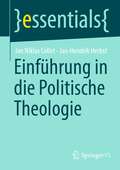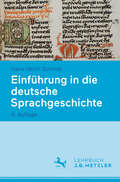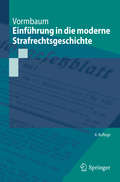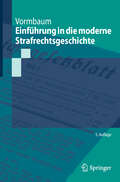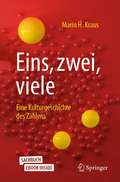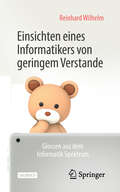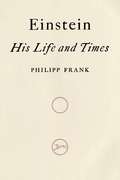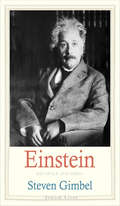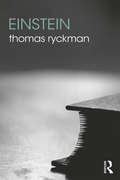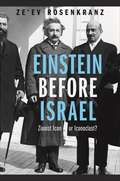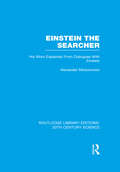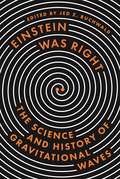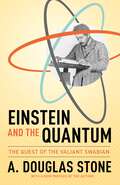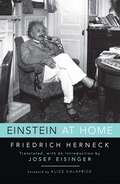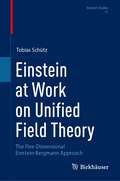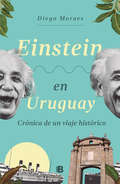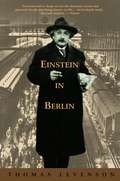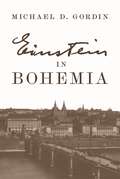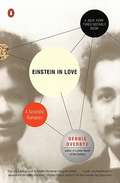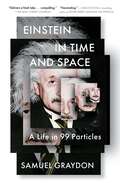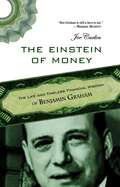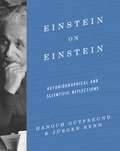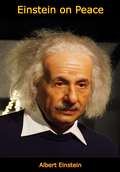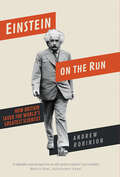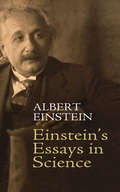- Table View
- List View
Einführung in die Politische Theologie (essentials)
by Jan-Hendrik Herbst Jan Niklas ColletPolitische Theologie erlebt derzeit ein Revival: Nachdem es eine längere Zeit lang still um die Politische Theologie geworden war, erfreut sie sich – nicht zuletzt angesichts multipler Krisenerscheinungen – aktuell wieder eines wachsenden Interesses. Aber was ist „Politische Theologie“ eigentlich? Die Einführung bietet eine begriffsgeschichtliche Orientierung und systematische Einordnung dieses schillernden Begriffs, eine vertiefende Auseinandersetzung mit den Politischen Theologien des Staatsrechtlers Carl Schmitt und des katholischen Theologen Johann Baptist Metz sowie eine Reflexion ausgewählter gegenwärtiger Diskussionsbeiträge in der deutschsprachigen katholischen Theologie. Das Buch verdeutlicht die ungebrochene Aktualität und Relevanz fundierter wissenschaftlicher und öffentlicher Auseinandersetzungen mit der Politischen Theologie.
Einführung in die deutsche Sprachgeschichte
by Hans Ulrich SchmidDiese Einführung bietet einen Überblick über die Entwicklung der deutschen Sprache vom Althochdeutschen bis zum Frühneuhochdeutschen mit Ausblicken auf die jüngere Sprachgeschichte und die Gegenwartssprache. Soweit es für das Verständnis heutiger oder historischer Sprachformen notwendig ist, wird auch das Germanische und Indogermanische einbezogen. Der Autor stellt die Sprachentwicklung auf den verschiedenen Ebenen dar: Laut und Schrift, Bildung von Wörtern und Wortformen, Wortschatz, Syntax und Semantik (Bedeutungswandel). Mit Tabellen (zu Laut- und Flexionsparadigmen) und Überblicksdarstellungen, Abbildungen, Textbeispielen und Analysen sowie vertiefenden Literaturhinweisen. – Für die vierte Auflage wurde der Band komplett durchgesehen und aktualisiert.
Einführung in die moderne Strafrechtsgeschichte (Springer-Lehrbuch)
by Thomas VormbaumModerne Strafrechtsgeschichte als Teil der juristischen Zeitgeschichte befasst sich mit der Rechtsentwicklung in unserer Rechtsepoche, d.h. im 19. bis 21. Jahrhundert. Unter Berücksichtigung der allgemeinen geschichtlichen Entwicklung einerseits, der Bezüge zur Gegenwart andererseits bietet das Buch eine anschauliche Darstellung der (vorwiegend deutschen) Strafrechtsentwicklung einschließlich der jüngsten Entwicklung, die in einem abschließenden Kapitel als „juristisches Zeitgeschehen“ behandelt wird. Es setzt nur Schulkenntnisse in allgemeiner Geschichte und Grundkenntnisse im Strafrecht voraus und erwartet im Übrigen von den Leserinnen und Lesern nur Aufgeschlossenheit für geschichts- und rechtstheoretische Fragestellungen.Die 4. Auflage berücksichtigt das seit der Vorauflage erschienene umfangreiche Schrifttum und vertieft weitere Einzelprobleme.
Einführung in die moderne Strafrechtsgeschichte (Springer-Lehrbuch)
by Thomas VormbaumModerne Strafrechtsgeschichte als Teil der juristischen Zeitgeschichte befasst sich mit der Rechtsentwicklung in unserer Rechtsepoche, d.h. im 19. bis 21. Jahrhundert. Unter Berücksichtigung der allgemeinen geschichtlichen Entwicklung einerseits, der Bezüge zur Gegenwart andererseits bietet das Buch eine anschauliche Darstellung der (vorwiegend deutschen) Strafrechtsentwicklung einschließlich der jüngsten Entwicklung, die in einem abschließenden Kapitel als „juristisches Zeitgeschehen“ behandelt wird. Es setzt nur Schulkenntnisse in allgemeiner Geschichte und Grundkenntnisse im Strafrecht voraus und erwartet im Übrigen von den Leserinnen und Lesern nur Aufgeschlossenheit für geschichts- und rechtstheoretische Fragestellungen. Die 5. Auflage berücksichtigt das seit der Vorauflage erschienene umfangreiche Schrifttum und vertieft weitere Einzelprobleme.
Eins, zwei, viele: Eine Kulturgeschichte des Zählens
by Mario H. KrausDieses Werk gibt einen Überblick über die Geschichte des Zählens, sowohl in mathematischen oder philosophischen als auch soziokulturellen Zusammenhängen. Die Frage "Warum und wie zählen wir eigentlich?" wird vielfältig untersucht und beantwortet. Bewusst kurz und unterhaltsam soll das Buch auch Anwendungen zeigen - im Alltag, in der Wissenschaft oder bei Volkszählungen und in der Stadtentwicklung.
Einsichten eines Informatikers von geringem Verstande: Glossen aus dem Informatik Spektrum
by Reinhard WilhelmEs ist für Fachleute wie Laien immer wieder überraschend, wie die Errungenschaften der Informatik das Leben der Menschen verbessern können, manchmal sogar in Richtungen, welche die Menschen gar nicht unbedingt wünschen. Die aus der Zeitschrift Informatik Spektrum stammenden Glossen in diesem Buch beschreiben kurzweilig und mit viel Humor viele solcher Errungenschaften: Wie sie entstehen, weshalb sie vielleicht doch nicht so groß sind und was noch auf uns zukommt.Eine amüsante Lektüre für Informatiker und ihre gequälten Anwender.
Einstein
by Philipp FrankMuch has been written about Albert Einstein, technical and biographical, but very little remains as valuable as this unique hybrid of a book written by Einstein’s colleague and contemporary. Both rich in personal insights and grounded in a deep knowledge of twentieth-century science, Phillip Frank's biography anchors the reader with a lucid overview of physics and draws an intimate portrait of the Nobel Prize-winner.
Einstein
by Steven GimbelIs relativity Jewish? The Nazis denigrated Albert Einstein's revolutionary theory by calling it "Jewish science," a charge typical of the ideological excesses of Hitler and his followers. Philosopher of science Steven Gimbel explores the many meanings of this provocative phrase and considers whether there is any sense in which Einstein's theory of relativity is Jewish. Arguing that we must take seriously the possibility that the Nazis were in some sense correct, Gimbel examines Einstein and his work to explore how beliefs, background, and environment may-or may not-influence the work of the scientist. You cannot understand Einstein's science, Gimbel declares, without knowing the history, religion, and philosophy that influenced it. No one, especially Einstein himself, denies Einstein's Jewish heritage, but many are uncomfortable saying that he was a Jew while he was at his desk working. To understand what "Jewish" means for Einstein's work, Gimbel first explores the many definitions of "Jewish" and asks whether there are elements of Talmudic thinking apparent in Einstein's theory of relativity. He applies this line of inquiry to other scientists, including Isaac Newton, René Descartes, Sigmund Freud, and Émile Durkheim, to consider whether and how their specific religious beliefs or backgrounds manifested in their scientific endeavors. Einstein's Jewish Science intertwines science, history, philosophy, theology, and politics in fresh and fascinating ways to solve the multifaceted riddle of what religion means-and what it means to science. There are some senses, Gimbel claims, in which Jews can find a special connection to E = mc2, and this claim leads to the engaging, spirited debate at the heart of this book.
Einstein (The Routledge Philosophers)
by Thomas RyckmanAlbert Einstein (1879–1955) was the most influential physicist of the 20th century. Less well known is that fundamental philosophical problems, such as concept formation, the role of epistemology in developing and explaining the character of physical theories, and the debate between positivism and realism, played a central role in his thought as a whole. Thomas Ryckman shows that already at the beginning of his career - at a time when the twin pillars of classical physics, Newtonian mechanics and Maxwell’s electromagnetism were known to have but limited validity - Einstein sought to advance physical theory by positing certain physical principles as secure footholds. That philosophy produced his greatest triumph, the general theory of relativity, and his greatest failure, an unwillingness to accept quantum mechanics. This book shows that Einstein’s philosophy grew from a lifelong aspiration for a unified theoretical representation encompassing all physical phenomena. It also considers how Einstein’s theories of relativity and criticisms of quantum theory shaped the course of 20th-century philosophy of science. Including a chronology, glossary, chapter summaries, and suggestions for further reading, Einstein is an ideal introduction to this iconic figure in 20th-century science and philosophy. It is essential reading for students of philosophy of science, and is also suitable for those working in related areas such as physics, history of science, or intellectual history.
Einstein Before Israel: Zionist Icon or Iconoclast?
by Professor Ze'ev RosenkranzAlbert Einstein was initially skeptical and even disdainful of the Zionist movement, yet he affiliated himself with this controversial political ideology and today is widely seen as an outspoken advocate for a modern Jewish homeland in Palestine. What enticed this renowned scientist and humanitarian, who repeatedly condemned nationalism of all forms, to radically change his views? Was he in fact a Zionist? Einstein Before Israel traces Einstein's involvement with Zionism from his initial contacts with the movement at the end of World War I to his emigration from Germany in 1933 in the wake of Hitler's rise to power. Drawing on a wealth of rare archival evidence--much of it never before published--this book offers the most nuanced picture yet of Einstein's complex and sometimes stormy relationship with Jewish nationalism. Ze'ev Rosenkranz sheds new light on Einstein's encounters with prominent Zionist leaders, and reveals exactly what Einstein did and didn't like about Zionist beliefs, objectives, and methods. He looks at the personal, cultural, and political factors that led Einstein to support certain goals of Jewish nationalism; his role in the birth of the Hebrew University; his impressions of the emerging Jewish settlements in Palestine; and his reaction to mounting violence in the Arab-Jewish conflict. Rosenkranz explores a host of fascinating questions, such as whether Zionists sought to silence Einstein's criticism of their movement, whether Einstein was the real manipulator, and whether this Zionist icon was indeed a committed believer in Zionism or an iconoclast beholden to no one.
Einstein The Searcher: His Work Explained from Dialogues with Einstein (Routledge Library Editions: 20th Century Science)
by Alexander MoszkowskiThis volume, first published in 1921, presents a series of portraits of Einstein, thus offering glimpses in the character and private reflections of the man who changed the course of modern science. Intended neither as a biography, nor as a résumé of Einsteinian physics, Einstein: The Searcher instead focusses on Einstein’s relationship with the scientific project as he himself conceived it, and so is still of contemporary significance for those puzzled by the spirit of scientific enquiry.
Einstein Was Right: The Science and History of Gravitational Waves
by Kip S. Thorne Harry Collins Jürgen Renn Daniel Kennefick Tilman Sauer Don Howard Alessandra Buonanno Professor Diana K. Buchwald Barry C. BarishAn authoritative interdisciplinary account of the historic discovery of gravitational wavesIn 1915, Albert Einstein predicted the existence of gravitational waves—ripples in the fabric of spacetime caused by the movement of large masses—as part of the theory of general relativity. A century later, researchers with the Laser Interferometer Gravitational-Wave Observatory (LIGO) confirmed Einstein's prediction, detecting gravitational waves generated by the collision of two black holes. Shedding new light on the hundred-year history of this momentous achievement, Einstein Was Right brings together essays by two of the physicists who won the Nobel Prize for their instrumental roles in the discovery, along with contributions by leading scholars who offer unparalleled insights into one of the most significant scientific breakthroughs of our time.This illuminating book features an introduction by Tilman Sauer and invaluable firsthand perspectives on the history and significance of the LIGO consortium by physicists Barry Barish and Kip Thorne. Theoretical physicist Alessandra Buonanno discusses the new possibilities opened by gravitational wave astronomy, and sociologist of science Harry Collins and historians of science Diana Kormos Buchwald, Daniel Kennefick, and Jürgen Renn provide further insights into the history of relativity and LIGO. The book closes with a reflection by philosopher Don Howard on the significance of Einstein's theory for the philosophy of science.Edited by Jed Buchwald, Einstein Was Right is a compelling and thought-provoking account of one of the most thrilling scientific discoveries of the modern age.
Einstein and the Quantum: The Quest of the Valiant Swabian
by A. Douglas StoneThe untold story of Albert Einstein's role as the father of quantum theoryEinstein and the Quantum reveals for the first time the full significance of Albert Einstein's contributions to quantum theory. Einstein famously rejected quantum mechanics, observing that God does not play dice. But, in fact, he thought more about the nature of atoms, molecules, and the emission and absorption of light—the core of what we now know as quantum theory—than he did about relativity.A compelling blend of physics, biography, and the history of science, Einstein and the Quantum shares the untold story of how Einstein—not Max Planck or Niels Bohr—was the driving force behind early quantum theory. It paints a vivid portrait of the iconic physicist as he grappled with the apparently contradictory nature of the atomic world, in which its invisible constituents defy the categories of classical physics, behaving simultaneously as both particle and wave. And it demonstrates how Einstein's later work on the emission and absorption of light, and on atomic gases, led directly to Erwin Schrödinger's breakthrough to the modern form of quantum mechanics. The book sheds light on why Einstein ultimately renounced his own brilliant work on quantum theory, due to his deep belief in science as something objective and eternal.
Einstein at Home
by Friedrich HerneckThese intimate, candid descriptions of the private life of Albert Einstein come from a series of interviews with Herta Waldow, a housekeeper who lived with Einstein and his wife and daughter from 1927 to 1933 at their residence in Berlin. After World War II, science historian Friedrich Herneck interviewed Ms. Waldow and published the conversations in the former East Germany. Unavailable in English till now, these five interviews offer fascinating glimpses into the great scientist's daily routines while he lived as a celebrated scientist in Weimar Germany. Einstein's well-known idiosyncrasies come to life in these conversations: his disheveled hair that was only poorly trimmed by his myopic wife, his love of classical music, his playing of the violin to help him think, his delight in sailing, his wide circle of friends and many social engagements, and his female companions besides his wife. Many celebrity acquaintances are also mentioned: from movie star Charlie Chaplin and conductor Erich Kleiber to writers Thomas and Heinrich Mann and fellow scientists Max Planck, Max Born, and Erwin Schrödinger. With a detailed introduction that puts these interviews in context, these colorful conversations create a vivid picture of Albert Einstein the man.
Einstein at Work on Unified Field Theory: The Five-Dimensional Einstein-Bergmann Approach (Einstein Studies #17)
by Tobias SchützThis book meticulously examines over one hundred documents of research notes by Albert Einstein, many of which were previously unidentified, held in the archives of The Hebrew University of Jerusalem and the Einstein Papers Project at Caltech. Focused on Einstein's quest for a five-dimensional unified field theory of gravitation and electromagnetism, the analysis provides unique insights into his mathematical skills, thinking, and modus operandi. This academic exploration also investigates the role of mathematics in Einstein’s theorizing with a special focus on projective geometry and delta functions.
Einstein en Uruguay: Crónica de un viaje histórico
by Diego MoraesUn exhaustivo trabajo de investigación en el que Diego Moraes reconstruye el viaje de uno de los personajes más importantes en la historia de la humanidad y un Uruguay a la vanguardia de la cultura y el pensamiento. En 1925 el famoso físico alemán Albert Einstein realizó una histórica visita al Uruguay. Casi cien años han pasado desde entonces pero, en la actualidad, ¿qué sabemos los uruguayos sobre aquel episodio? Una estatua ubicada en la Plaza de los Treinta y Tres, en el Centro montevideano, recuerda el momento más famoso de aquella visita: el célebre encuentro mantenido en ese mismo sitio entre Einstein y el filósofo Carlos Vaz Ferreira. Sin embargo, es poco más lo que se conoce, en términos generales. ¿Qué vino a hacer Einstein al Uruguay? ¿Quién lo invitó a nuestro país y por qué? ¿Qué personajes prominentes de la sociedad uruguaya conoció durante su estadía? ¿Dónde se alojó? ¿Qué actividades realizó durante la semana que permaneció en suelo uruguayo? ¿Qué impresión dejó entre los compatriotas de 1925? E, inversa mente, ¿qué opinión guardó luego de su paso por estas tierras? Estas son solo algunas de las preguntas que este libro aspira a responder.
Einstein in Berlin
by Thomas LevensonIn a book that is both biography and the most exciting form of history, here are eighteen years in the life of a man, Albert Einstein, and a city, Berlin, that were in many ways the defining years of the twentieth century. Einstein in BerlinIn the spring of 1913 two of the giants of modern science traveled to Zurich. Their mission: to offer the most prestigious position in the very center of European scientific life to a man who had just six years before been a mere patent clerk. Albert Einstein accepted, arriving in Berlin in March 1914 to take up his new post. In December 1932 he left Berlin forever. “Take a good look,” he said to his wife as they walked away from their house. “You will never see it again.”In between, Einstein’s Berlin years capture in microcosm the odyssey of the twentieth century. It is a century that opens with extravagant hopes--and climaxes in unparalleled calamity. These are tumultuous times, seen through the life of one man who is at once witness to and architect of his day--and ours. He is present at the events that will shape the journey from the commencement of the Great War to the rumblings of the next one. We begin with the eminent scientist, already widely recognized for his special theory of relativity. His personal life is in turmoil, with his marriage collapsing, an affair under way. Within two years of his arrival in Berlin he makes one of the landmark discoveries of all time: a new theory of gravity--and before long is transformed into the first international pop star of science. He flourishes during a war he hates, and serves as an instrument of reconciliation in the early months of the peace; he becomes first a symbol of the hope of reason, then a focus for the rage and madness of the right. And throughout these years Berlin is an equal character, with its astonishing eruption of revolutionary pathways in art and architecture, in music, theater, and literature. Its wild street life and sexual excesses are notorious. But with the debacle of the depression and Hitler’s growing power, Berlin will be transformed, until by the end of 1932 it is no longer a safe home for Einstein. Once a hero, now vilified not only as the perpetrator of “Jewish physics” but as the preeminent symbol of all that the Nazis loathe, he knows it is time to leave.
Einstein in Bohemia
by Professor Michael D. GordinA finely drawn portrait of Einstein's sixteen months in PragueIn the spring of 1911, Albert Einstein moved with his wife and two sons to Prague, the capital of Bohemia, where he accepted a post as a professor of theoretical physics. Though he intended to make Prague his home, he lived there for just sixteen months, an interlude that his biographies typically dismiss as a brief and inconsequential episode. Einstein in Bohemia is a spellbinding portrait of the city that touched Einstein's life in unexpected ways—and of the gifted young scientist who left his mark on the science, literature, and politics of Prague.Michael Gordin's narrative is a masterfully crafted account of a person encountering a particular place at a specific moment in time. Despite being heir to almost a millennium of history, Einstein's Prague was a relatively marginal city within the sprawling Austro-Hungarian Empire. Yet Prague, its history, and its multifaceted culture changed the trajectories of Einstein's personal and scientific life. It was here that his marriage unraveled, where he first began thinking seriously about his Jewish identity, and where he embarked on the project of general relativity. Prague was also where he formed lasting friendships with novelist Max Brod, Zionist intellectual Hugo Bergmann, physicist Philipp Frank, and other important figures.Einstein in Bohemia sheds light on this transformative period of Einstein's life and career, and brings vividly to life a beguiling city in the last years of the Austro-Hungarian Empire.
Einstein in Love
by Dennis OverbyeIn Einstein in Love, Dennis Overbye has written the first profile of the great scientist to focus exclusively on his early adulthood, when his major discoveries were made. It reveals Einstein to be very much a young man of his time-draft dodger, self-styled bohemian, poet, violinist, and cocky, charismatic genius who left personal and professional chaos in his wake. Drawing upon hundreds of unpublished letters and a decade of research, Einstein in Love is a penetrating portrait of the modern era's most influential thinker.
Einstein in Time and Space: A Life in 99 Particles
by Samuel GraydonWalter Isaacson&’s Einstein meets Craig Brown&’s 99 Glimpses of Princess Margaret, in this innovative biography of the famous physicist told in ninety-nine dazzling vignettes.Most of us would agree that Albert Einstein&’s name is synonymous with &“genius&” and that his likeness is often used as a shorthand for all scientists, appearing everywhere from cartoons to textbooks. He has become more myth than man. That being the case, how best to capture his essence? In Einstein in Time and Space, talented young science journalist Samuel Graydon answers that question with an illuminating mosaic—99 intriguingly different particles that cumulatively reveal Einstein&’s contradictory and multitudinous nature. Glimpsed among these shards: a slacker who failed every subject but math, a job seeker who couldn&’t get hired, a lothario who courted many women, and a charmer who was the life of the party. As brilliant as he was inconsistent, Einstein was simultaneously an avid supporter of the NAACP and the fight for civil rights and someone capable of great prejudice. He was loved by many, known by few, and inspirational to a generation of young physicists. Graydon reveals every corner of Einstein&’s world: the false reporting that rocketed Einstein to fame nearly overnight, his effect on people he met merely in passing, even the remarkable posthumous journey of the famed physicist&’s brain. Entertaining, comforting, bolstering, and shocking, Einstein in Time and Space is the unique story of a man who redefined how we view our universe and our place within it.
Einstein of Money: The Life and Timeless Financial Wisdom of Benjamin Graham
by Joe CarlenWarren Buffett-widely considered the most successful investor of all time-has repeatedly acknowledged Benjamin Graham as the primary influence on his investment approach. Indeed, there is a direct line between the record-shattering investing performance of Buffett (and other value investors) and Graham's life. In six books and dozens of papers, Graham-known as the "Dean of Wall Street"-left an extensive account of an investing system that, as Buffett can attest, actually works! This biography of Benjamin Graham, the first written with access to his posthumously published memoirs, explains Graham's most essential wealth-creation concepts while telling the colorful story of his amazing business career and his multifaceted, unconventional personal life. The author distills the best from Graham's extensive published works and draws from personal interviews he conducted with Warren Buffett, Charles Brandes, and many other top US and global value investors, as well as Graham's surviving children and friends. Warren Buffett once said, "No one ever became poor by reading Graham." Find out for yourself by reading Carlen's lively account of Benjamin Graham's fascinating life and time-tested techniques for generating wealth.
Einstein on Einstein: Autobiographical and Scientific Reflections
by Hanoch Gutfreund Jürgen RennNew perspectives on the iconic physicist's scientific and philosophical formationAt the end of World War II, Albert Einstein was invited to write his intellectual autobiography for the Library of Living Philosophers. The resulting book was his uniquely personal Autobiographical Notes, a classic work in the history of science that explains the development of his ideas with unmatched warmth and clarity. Hanoch Gutfreund and Jürgen Renn introduce Einstein's scientific reflections to today's readers, tracing his intellectual formation from childhood to old age and offering a compelling portrait of the making of a philosopher-scientist.Einstein on Einstein features the full English text of Autobiographical Notes along with incisive essays that place Einstein's reflections in the context of the different stages of his scientific life. Gutfreund and Renn draw on Einstein's writings, personal correspondence, and critical writings by Einstein's contemporaries to provide new perspectives on his greatest discoveries. Also included are Einstein's responses to his critics, which shed additional light on his scientific and philosophical worldview. Gutfreund and Renn quote extensively from Einstein's initial, unpublished attempts to formulate his response, and also look at another brief autobiographical text by Einstein, written a few weeks before his death, which is published here for the first time in English.Complete with evocative drawings by artist Laurent Taudin, Einstein on Einstein illuminates the iconic physicist's journey to general relativity while situating his revolutionary ideas alongside other astonishing scientific breakthroughs of the twentieth century.
Einstein on Peace: His Private Thoughts And Public Stands On Nationalism, Zionism, War, Peace, And The Bomb
by Albert Einstein Otto Nathan“Einstein was not only the ablest man of science of his generation, he was also a wise man, which is something different. If statesmen had listened to him, the course of human events would have been less disastrous than it has been.”This verdict, from the Preface by Bertrand Russell, sums up the importance of this first collection of Albert Einstein’s writings on war, peace, and the atom bomb. In this volume, thanks to the Estate of Albert Einstein, the complete story is told of how one of the greatest minds of modern times worked from 1914 until 1955 on the problem of peace. It is a fascinating record of a man’s courage, his sincerity, and his concern for those who survive him.This book is also a history of the peace movement in modern times. Here are letters to and from some of the most famous men of his generation, including the correspondence between Einstein and Sigmund Freud on aggression and war, and the true story of his famous letter to President Roosevelt reporting the theoretical possibility of nuclear fission. It is the living record of more than forty years of Einstein’s untiring struggle to mobilize forces all over the world for the abolition of war and the creation of a supranational organization to solve conflicts among nations.
Einstein on the Run: How Britain Saved the World's Greatest Scientist
by Andrew RobinsonA "highly readable" account of the role Britain played in Einstein's life—by inspiring his teenage passion for physics and providing refuge from the Nazis (The Wall Street Journal).In late 1933, Albert Einstein found himself living alone in an isolated holiday hut in rural England. There, he toiled peacefully at mathematics, occasionally stepping out for walks or to play his violin. But how had Einstein come to abandon his Berlin home and go “on the run”?This lively account tells the story of the world’s greatest scientist’s time in Britain for the first time, showing why the country was the perfect refuge for Einstein from rumored assassination plots by Nazi agents. Young Einstein’s passion for British physics, epitomized by Newton, had sparked his scientific development around 1900. British astronomers had confirmed his general theory of relativity, making him internationally famous in 1919. Welcomed by the British people, who helped him campaign against Nazi anti-Semitism, he even intended to become a British citizen. So why did Einstein then leave Britain, never to return to Europe?“A vivid look at how the U.K. affected the German-born physicist’s life and thinking.” —Publishers Weekly“A marvelous job of pulling new and interesting material out of the Einstein archives . . . I suspect that even readers who have devoured many books about Einstein and are already familiar with his interactions with the English . . . will find much to learn and enjoy.” —Metascience Journal“Robinson has that rare knack for presenting a near-encyclopedic volume of historical information, anecdotes and contemporaneous accounts in a thoroughly delightful fashion.” —Physics WorldIncludes photographs and illustrations
Einstein's Essays in Science
by Albert Einstein Alan HarrisHis name is synonymous with "genius," but these essays by the renowned physicist and scholar are accessible to any reader. In addition to outlining the core of relativity theory in everyday language, Albert Einstein presents fascinating discussions of other scientific fields to which he made significant contributions. The Nobel Laureate also profiles some of history's most influential physicists, upon whose studies his own work was based.Assembled during Einstein's lifetime from his speeches and essays, this book marks the first presentation to the wider world of the scientist's accomplishments in the field of abstract physics. Along with relativity theory, these articles examine the methods of theoretical physics, principles of research, and the concept of scientific truth. Einstein's speeches to audiences at Columbia University and the Prussian Academy of Science appear here, along with his insightful observations on such giants of science as Johannes Kepler, Sir Isaac Newton, James Clerk Maxwell, Niels Bohr, Max Planck, and others.
